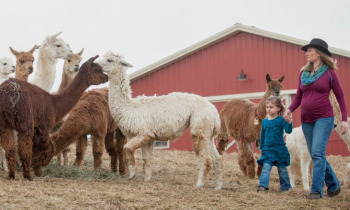Alvina Maynard likes to say she didn’t seek out alpaca ranching, rather it found her. Maynard is a military veteran in Richmond, Kentucky. It was during a hotel stay while she was still with the Air Force that she saw a commercial about alpacas being farmed as livestock. And the rest is history.
Today, Maynard and her family operate River Hill Ranch. “We grow clothes,” she says. River Hill has evolved into a greater mission of regenerative agriculture and education. Not only is she growing clothes but she has also developed children’s educational programs and an agritourism operation. River Hill Ranch is selling their Kentucky-grown, American-made alpaca sweaters, socks, and hats at the Lexington Farmers Market, through an online store, and in an on-site gift shop. For Maynard, being part of the resurgence in American-made sustainable manufacturing is a big deal. “Our value-added manufacturing happens within a 400-mile radius of our farm. All our products are grown regeneratively, and manufactured using sustainable methods right here in the U.S.”
 Maynard says when she set out to launch her alpaca farm, she had no idea of the sustainable agriculture resources and farmer-veteran community that already existed. “When I came on to my land, it wasn’t in great shape,” she says. “I overgrazed my fields when I first started. I didn’t know how to manage ruminants correctly. ATTRA gave me the tools I needed to be able to do that. Not only did my land rebound, but the forage production per acre has at least doubled if not tripled because of the resources ATTRA empowered me with. I am now able to grow much more with less.”
Maynard says when she set out to launch her alpaca farm, she had no idea of the sustainable agriculture resources and farmer-veteran community that already existed. “When I came on to my land, it wasn’t in great shape,” she says. “I overgrazed my fields when I first started. I didn’t know how to manage ruminants correctly. ATTRA gave me the tools I needed to be able to do that. Not only did my land rebound, but the forage production per acre has at least doubled if not tripled because of the resources ATTRA empowered me with. I am now able to grow much more with less.”
Maynard credits ATTRA and our sustainable agriculture experts who’ve provided the alpaca industry with technical assistance with changing the industry for the better. “ATTRA influenced a whole livestock industry in the U.S. to rethink how they were managing their livestock in a way that regenerates the soil.”
Maynard was recently a guest on ATTRA’s podcast series, Voices from the Field. Give it a listen!
